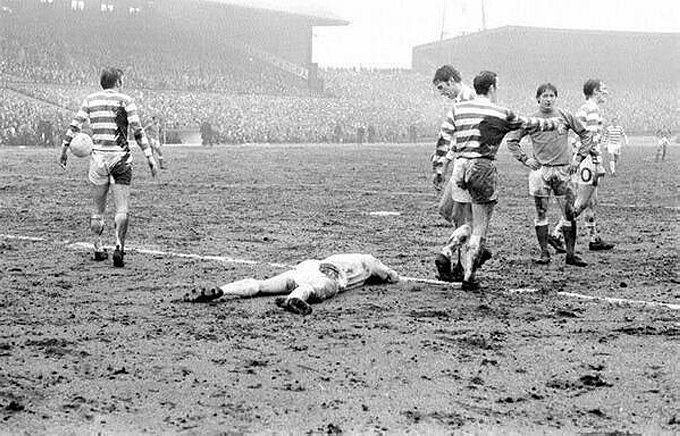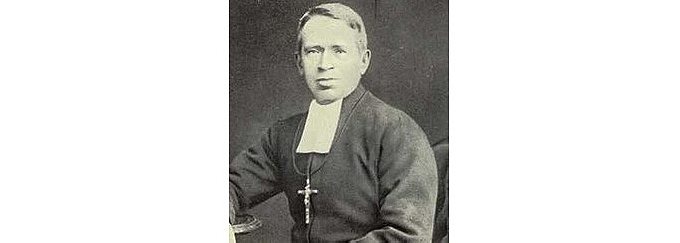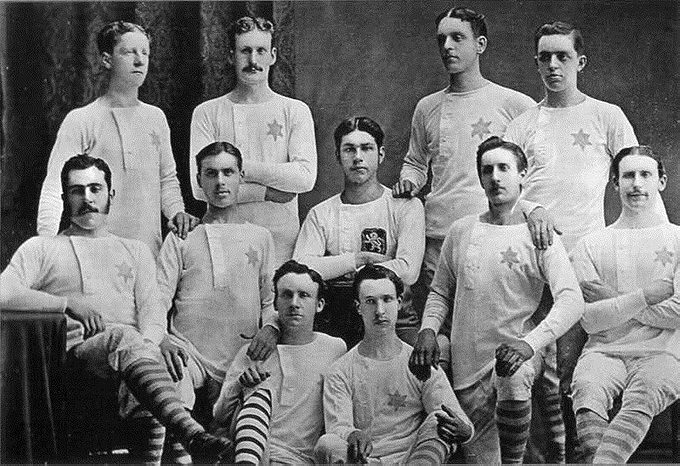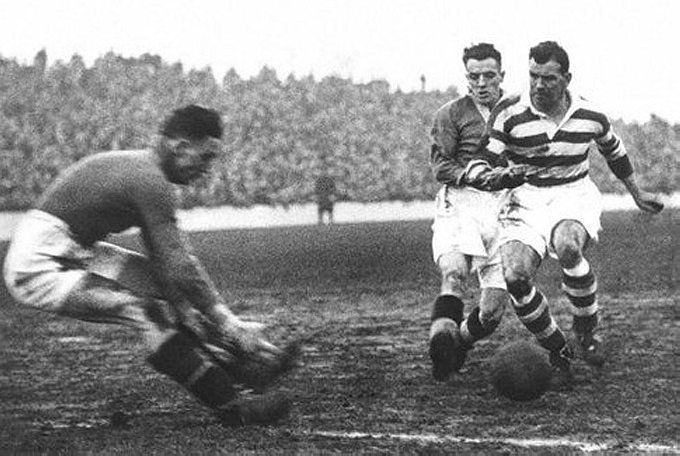Glasgow’s storied Rangers Football Club was gutted last year. Where does that leave the fans of its oldest and only rival?
GLASGOW, Scotland—
Last year the sad, mad, brutal and beautiful series known as Celtic versus Rangers came to an end after an unbroken 125-year run. Proud Rangers—one of the oldest, grandest, richest clubs in world football—simply ran out of money.
The reasons why this happened would not be unfamiliar to sports-watchers anywhere on earth: greed, envy, and overspending all played a role. There were unique local wrinkles—the Scottish media all but ignored the calamity at the same time as it was being masterfully reported and dissected by anonymous bloggers, especially the unnamed author of a suspiciously well-informed blog called Rangers Tax Case. But the demise of the august club, which was sent to the lowest league in Scotland last year, raises more universal questions for those of us who, like the RTC blogger and me, wear Celtic’s green colours. Should we gloat? Should we grieve? What does it mean to support a team whose greatest and only rival is gone?

The first time I saw Celtic take on Rangers, in the flesh, was 34 years ago. The colours and smells and sounds of that late May afternoon, with its watery Scottish sun, remain startlingly fresh in my memory to this day.
I was 15 years old and though I had been attending soccer matches since I was five, it was only now that my father deemed me sufficiently mature and robust to handle the demands that the occasion would make on me, both physically and psychologically. The Celtic versus Rangers soccer match had begun in 1887—Rangers were Celtic’s first official opponents—and by the time I witnessed the fixture in the flesh it divided Scottish society along several cultural, religious and political fault-lines. To pledge allegiance to one or the other was to reveal your entire cultural, ethnic, religious and political DNA.
This has been a rivalry marinated and matured in a 125-year vintage. The two clubs were once friendly—hence their definition as the Old Firm, because they were seen by press and public alike as mutual moneymakers—but their joint dominance of the Scottish game, along with a heinous cocktail of bigotry and sectarianism had long since turned their matches into 90 minutes of passionate antipathy and hostility, with hatred leeching from the stands.

It is still often portrayed as a ‘Catholic versus Protestant’ enmity, but that is now overly simplistic. Churchgoing by supporters of both clubs is at an all time low. In truth, the rivalry is now all about sheer tribalism and the schisms within Christianity have little to do with it.
History is undeniable, however. Celtic were established to provide food and shelter in Glasgow’s east end for the poor Catholic Irish who were fleeing persecution and famine in their homeland. They gathered in enclaves such as Parkhead and lived in abject poverty, but club founder Brother Walfrid, an Irish Marist brother, could see that a successful football club could raise money to sustain them. The club has since come to represent the aspirations and the pride of five generations of that immigrant race, not least because they were wildly successful from the outset. In the 1890s, Celtic could lay fair claim to be the most financially successful club in the world, as tens of thousands of mainly Catholic Irish supporters always came to see them, while they made big profits from touring England and even Contintental Europe, the first Scottish club to generate such income at a time when Glasgow and Lancashire were the epicentres of the fledgling sport of association football.

As Celtic’s Irish and Catholic antecedents were detested by most of the Scottish populace, the need for a homegrown rival grew swiftly, encouraged by an anti-Catholic press. In the early years of the 20th century, the Rangers, almost by default, became Celtic’s main adversaries. The club based at Ibrox in Govan on Glasgow’s south side was transformed into a totem for the established Protestant faith and Anglo-Saxon Unionist tradition; allegiance to the Blues was built on loyalty to the British crown and the old order of things. They had a policy of not signing Catholic players for decades, while Celtic, who had a non-sectarian signing policy, remained a Catholic enclave in the boardroom. Celtic’s first Protestant manager was also their greatest. The incomparable Jock Stein led the club to victory in the European Cup of 1967, becoming the first British team to be crowned champions of Europe. And yet when he stepped down as manager after thirteen seasons of unprecedented success, he was not offered a directorship at the club.

I had been reared on tales of this history of religious and other enmities and of the torrid games between these two clubs, and had longed for the time to arrive when I too would be summoned to participate in this, the cultural narrative of my family stretching back 150 years to a farmhouse on the west coast of Ireland. Yet suddenly I didn’t want to be there: perhaps the atmosphere was just too intense; the shouts and alarums around me too aggressive. There could be no turning back now though: I was strapped in and the rollercoaster was beginning slowly to move. In those few moments before my team in green and white faced their rivals in blue it seemed that the world was ending; nothing I had ever heard before was as loud or as fearful as this. It was Armageddon in a stadium. I survived, caught up in the surrounding fervent ardour for my Celtic, shaking with adrenaline for hours afterwards.
Just a few years after this, I was attending university and promising to take my new American friend to this game. Jim and I had met in Glasgow’s wee small hours: me returning from another student bacchanal, he trying to recover from jetlag. And so I told him of this game over whisky and a soft, red packet of Winstons. Weeks later we were at an Old Firm game and I watched this New York Mets fan burst into tears at the passion and intensity of it all.

In February of last year, the club that Alex Salmond, Scotland’s First Minister, had described as a “Scottish institution” was forced into administration, the British equivalent of Chapter 11, for non-payment of taxes. Her Majesty’s Revenue and Customs (HMRC, Britain’s IRS) went about liquidating Rangers.
That is not to say that Rangers doesn’t exist. There is a club with that name that has risen from the ashes. But it was forced by a vote of all the other Scottish clubs to start life again in the bottom tier of Scottish football, beginning from the 2012-2013 season. Rangers had never once been outside Scotland’s top flight and had won 54 national league championships, more than any other club side in the world. Since 1985 there has been an absolute duopoly; no club other than Rangers and Celtic has been champions of Scotland. There have been 27 years of two-horse races between them, at times decided by the very tiniest of margins. That era is over.
Rangers fans, as one might expect, are resentful. And even in this off-field calamity they see the silent and baleful influence of Celtic, whose directors are supposed to have cajoled the other clubs into voting Rangers down, though there is evidence Celtic actually wanted Rangers to stay up as they knew that lack of regular fixtures against them would slash the clubs’ income. But here is what we know of the Rangers’ downfall: the proximate cause was an obscure little offshore tax avoidance device called an Employment Benefit Trust, in which players are given ‘loans’ that the club never recalls. That’s all well and good in moderation, but tax authorities deemed Rangers’ use of these EBTs to be tax evasion and went after Rangers for up to £49 million in back taxes. A year ago, a tax tribunal found that the EBTs were (barely) legal in a ruling that Rangers interpreted as a vindication of their policy. The UK tax authorities are currently appealing.
MURRAY GAMBLED ON TURNING RANGERS INTO ONE OF EUROPE’S ELITE SOCCER CLUBS
For the ten years or so that Rangers used this ingenious scheme, they won trophies with many players they may not otherwise have been able to afford. The players, who may well face individual action themselves if the tax authorities win their appeal, lived a glamorous lifestyle, with Porsches and Bentleys festooning their car park at Rangers’ Murray Park training ground.
The training center is named for Sir David Murray, a steel magnate and one of the UK’s most garlanded entrepreneurs. From the 1990s onwards, Murray gambled on turning Rangers into one of Europe’s elite soccer clubs, buying elite players and paying big wages while importing expensive foreign managers such as Dick Advocaat and Paul Le Guen. The gamble failed, largely because Celtic thrived from 2000 onwards under their twin Titans, Swedish striker Henrik Larsson and Northern Irish manager Martin O’Neill.
IT WAS AKIN TO ASKING THE MARQUIS DE SADE TO ENTERTAIN YOUR WIFE IN YOUR ABSENCE
Since Rangers did not win everything and frequently failed in European competition where the real money lies, their debts grew exponentially and Murray was forced by his bankers to sell Rangers to an unknown property developer called Craig Whyte. It was akin to asking the Marquis de Sade to entertain your wife in your absence.
Whyte boasted of having millions to invest but soon Celtic fans and even some Rangers supporters were referring to him as the ‘thousandaire.’ Under Whyte’s tenure, which lasted from April 2011 until the club went into administration nine months later, Rangers withheld all taxes—a sum approaching £14m. During this time hundreds of creditors simply weren’t paid, ranging from European soccer clubs to local newsagents, florists and taxi firms. It was HMRC, however, who made the calls that finished Rangers.
The Scottish mainstream media’s failure to cover the story adequately handed an historic opportunity to a new breed of citizen journalists and bloggers. Chief among these was a blog called The Rangers Tax Case (RTC) at rangerstaxcase.wordpress.com. In March 2011, the anonymous author of the blog began to forensically outline the extent of Rangers’ financial problems and, in minute detail, the thrust of the tax authorities’ case against the club. Other blogs, many of them obviously by professional people and journalists writing incognito, tore into Rangers, but none did so with the scalpel-like precision of Rangers Tax Case.
The sheer extent of the detail that the blogger amassed convinced many that this was a person with inside HMRC contacts. He received death threats which Scottish police took seriously as Rangers fans on the Internet went apoplectic—at least until the claims Rangers Tax Case was making were proven correct.

Some of the predictions were extraordinary. While the press airily dismissed talk of crisis at Rangers in August, 2011, Rangers Tax Case wrote: “Rangers FC face a cash shortfall by the end of this season of about £19m. Without a fresh cash injection, Rangers will run out of money in October/November.” They actually did so in December.
There were other uncanny insights, such as when he wrote that the tax authorities’ “claiming of such a huge scalp might have more value than the amount of any recovery directly from Rangers.” He could not have been more correct—HMRC is now reporting record tax receipts in Scotland.
The sheer opprobrium heaped on Rangers Tax Case was in itself almost proof that he was correct. A Rangers fan was arrested and charged for making online threats, one of those who believed that being ‘anonymous’ on the internet made him impervious.
THAT’S WHERE THE STORY BECOMES MUDDY FOR ME
Whyte, meanwhile, rubbished Rangers Tax Case and the few other reporters who dared question the club. He ended up the most reviled figure in Scotland, while in May last year Rangers Tax Case was awarded the highly prestigious Orwell Prize for journalism.
Amazingly for the overgrown village that is Scotland, the blogger behind Rangers Tax Case has never been identified (he stopped blogging after the tax tribunal’s verdict). Intense speculation surrounds a former senior figure in Gordon Brown’s Labour government, who is known to have close links to HMRC, and, damningly, is an avowed Celtic fan (the RTC blogger is, too: he wrote in the Guardian that he has spent much of his life “devoted to supporting my team, Celtic”).
But that’s where the story becomes muddy for me. I am strangely unenthusiastic about watching my team’s rivals wallow in their own mess. Years of litigation lie ahead and there are intense disputes between Rangers’ current owners and their immediate predecessors, such as the motormouth Yorkshireman Charles Green who appeared from nowhere to “save” the club last summer.
NO ONE CAN DOUBT RANGERS’ FAN LOYALTY
Chairmen, chief executives and directors have replaced each other with bewildering speed and, it seems, there is a cadre of opportunistic businessmen circling the club, who will make their pitch at a much-delayed annual general meeting on December 19. Meanwhile fans mount forlorn demonstrations outside Ibrox holding banners that say ‘Give Us Back Our Club.’ No one can doubt their loyalty, as they have supported the club in huge numbers ever since. Last August, they set the first of several world records for attendance at a fourth-tier football match when nearly 50,000 fans showed up to see them demolish tiny East Stirlingshire 5-1.
Some Celtic fans have delighted in the downfall, taunting those who continue to fill Ibrox in impressive numbers that their club died last year and the new team should be known as Sevco, the name of the off-the-shelf company through which Green and his cohorts originally bought Rangers from the administrators. Others actively campaign for the term Old Firm to be abandoned.
Me? I suspect I am like many Celtic supporters. The League Cup and Scottish Cup are the only two competitions in which the Old Firm can now meet. Earlier this season, Rangers were knocked out of the Scottish League Cup in the first round, defeated by Forfar Athletic, a semi-professional outfit nicknamed “The Loons”. I recall with feeling how I greeted that news—‘Damn, another lost chance to beat that lot.’
So it was. Thus it will always be.
[Header image by: Clive Brunskill/Getty Images]
